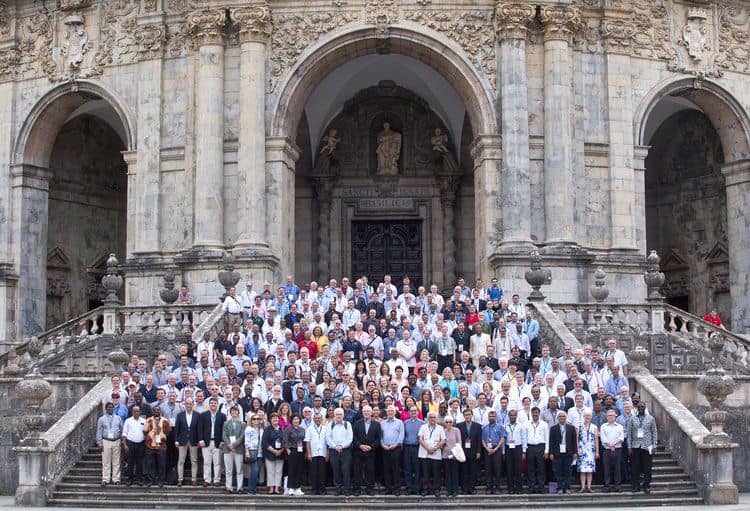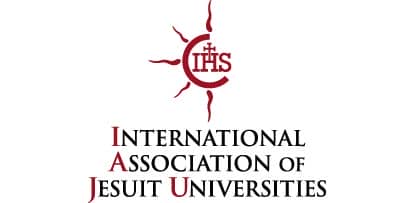This website uses cookies so that we can provide you with the best user experience possible. Cookie information is stored in your browser and performs functions such as recognising you when you return to our website and helping our team to understand which sections of the website you find most interesting and useful.
IAJU, One Year of Global Collaboration
The International Association of Jesuit Universities (IAJU) is a global network of Jesuit institutions of higher education that serves as the international advisory and coordinating body for the Secretariat of Jesuit Higher Education. On July 11, 2019, IAJU will mark one year since it was approved by Rev. Arturo Sosa, S.J., Superior General of the Society of Jesus, during an international assembly at the University of Deusto in Bilbao, Spain.
At the core of IAJU are values of collaboration; seeking depth against the globalization of superficiality; discernment; and a preferential option for the poor. These values are now also enshrined in the Society’s four Universal Apostolic Preferences (UAPs), which were announced by Fr. Sosa in early 2019 to help influence the direction and focus of all Jesuit institutions and organizations. They are: promoting the tools of discernment and the Spiritual Exercises of St. Ignatius; walking with the excluded and victims of all kinds; journeying with youth to understand their concerns and assist them as they find their vocations in life; and care for our common home in the spirit of Pope Francis’ environmental encyclical, Laudato Si’.
The IAJU constituency includes more than 1,400 individual faculties and research centers, spread across 55 countries. This network is called to share and collaborate toward better serving IAJU’s mission of pursuing reconciliation, faith and justice. Each college and university is a member of one of the six regional associations of Jesuit colleges and universities, making IAJU “a network of networks.”

At a time when global challenges are impacting us all and solutions require new and creative thinking and action, IAJU is more relevant than ever. In this new global context, there is an urgent need to form a different kind of political, civic and economic leadership. As globalization continues to change our world, there is a need for global citizens to advocate for greater openness, understanding, responsibility and collaboration
From its start, IAJU has operated from a strategic agenda composed of six priorities for its members. These priorities are being promoted by task forces set up with membership from six geographic regions across the world. They are as follows: a) the promotion of peace and reconciliation research and advocacy; b) education for the marginalized; c) inter-religious dialogue and understanding; d) preparation of civic and political leaders; e) environmental and economic justice; and f) the formation of discerning faculty and administrators of our institutions. These priorities are an initial response to the Society’s four UAPs which will be further refined and enhanced through the process of discernment.

Over the past year, IAJU has supported the development of regional associations in regions where there previously were no Jesuit associations (namely Europe and Africa). It has also encouraged the creation and development of associations of professional schools within the network, such as the International Association of Jesuit Engineering Schools (IAJES) and the International Association of Jesuit Business Schools (IAJBS). IAJU has also put its efforts toward mapping opportunities for improvement on the safeguarding policies of its member institutions.
AJU is recognized as the international advisory and coordinating body for the Secretariat of Jesuit Higher Education and, through him, Father General. IAJU has especially served this channel through efforts to map opportunities for improvement on the Safeguarding policies of its member institutions.
Since the formation of its constitution, IAJU has supported the development of regional associations in regions where there previously was no Jesuit association (namely Europe and Africa). It has also encouraged the creation and development of associations of professional schools within the network, such as the International Association of Jesuit Engineering Schools (IAJES), the International Association of Jesuit Business Schools (IAJBS).

In light of the UAPs and working within its six very diverse and global task forces, the IAJU strives to strengthen and advance the following projects:
- Development of theoretical and practical reflection on the reconciliation processes by researchers and practitioners at our institutions.
- Promotion of a “new paradigm” in Jesuit business education which takes seriously the concerns voiced by leading experts in economic and environmental justice.
- Creation of a network that aims to develop reflection on the challenges and opportunities that secularization and religious diversity pose to Jesuit higher education.
- Advancing online education for those at the margins (e.g. migrants and refugees) in areas with a critical shortage of higher education opportunities.
- An annual summit on climate change and Jesuit education.
- Coordination of a panel of experts on the challenges of civic and political leadership development.
These are just some of the projects and institutions currently supported by IAJU. Beyond this, existing global projects such as Jesuit Worldwide Learning (JWL) and Healing Earth have also found IAJU to be a strong and supportive partner. To foster a sense of belonging to the network and to animate solidarity and collaboration among its members, IAJU has formed several communication channels over the past year, including a newsletter and interactive website.
Although only one year old, IAJU is very thankful for the great collaboration, support and solidarity it has experienced from the entire global network. The Association has sensed the grace of the commitment from different institutions, associations and people who share the same mission of addressing global challenges hurting our world. Without this support and collaboration, IAJU would not be where it is today and would not see any light when looking to the future.
To learn more about IAJU, please visit iaju.org. Click here to receive the Association’s weekly e-newsletter.





